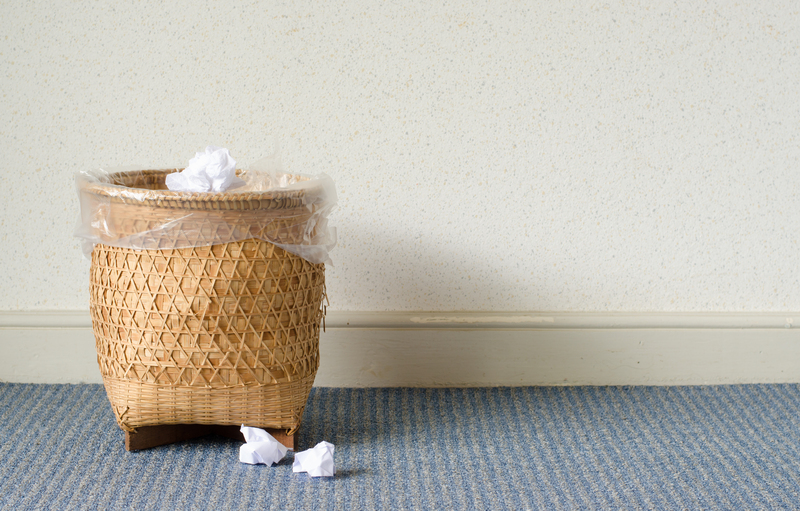Skip the High Costs With These Bulky Waste Item Savings
Are you tired of astronomical fees when disposing of old furniture, mattresses, garden waste, or broken appliances? Bulky waste disposal is notorious for its high costs. Fortunately, there are several savvy ways you can save on bulky waste removal while being environmentally responsible and keeping your community clean. In this comprehensive guide, you'll discover actionable tips and alternative solutions that help you skip expensive waste management services without sacrificing convenience or compliance.

Understanding Bulky Waste and Why Costs Add Up
Bulky waste items refer to those oversized household materials that can't fit in a regular curbside bin. Examples include:
- Large furniture items (sofas, armchairs, beds)
- White goods (washing machines, ovens, fridges)
- Garden refuse and tree branches
- Old carpets and mattresses
- Electronics (TVs, computers, monitors)
- Building debris and renovation materials
Disposing of these items is rarely straightforward. Traditional waste companies often charge by the item, by weight, or even by volume of space taken in their trucks. Municipal "special collections" aren't always free--some charge per piece, while others have strict quotas. If you exceed these limits, the costs can quickly balloon.
Why Is Bulky Waste Disposal So Expensive?
The high cost of bulky waste disposal comes down to:
- Labor-Intensive Handling: Large, heavy items require staff time and equipment.
- Specialized Transportation: Trucking and loading can be complex for oversized or awkwardly shaped items.
- Environmental Regulations: Many bulky items (like fridges, mattresses, and electronics) need special processing, which increases costs.
- Landfill and Recycling Fees: Proper disposal often involves extra charges to comply with recycling and landfill laws.
So, is there a way to avoid or minimize these costs? Absolutely! Let's explore the best ways to save big on bulky item waste disposal.
Top Strategies to Save on Bulky Waste Removal
1. Leverage Local Council Services
Many local councils and municipalities run periodic bulky waste collection events where residents can dispose of items for free or at a significant discount. Watch for announcements on your local government's website or social media pages. Some areas provide one or two complimentary pickups per year--make sure to schedule your waste disposal accordingly to maximize these free services.
2. Donate or Sell Usable Items
Before you decide to throw out that sofa or wardrobe, ask yourself: Could someone else use this? Charities, thrift shops, and social enterprises often accept gently used bulky items. You can:
- Call local charities and ask about their collection policies.
- List items on sites like Facebook Marketplace, Craigslist, Freecycle, or Gumtree for free pickup by others.
- Host a garage sale to quickly shift multiple items at once.
Donating or selling not only skips the high costs of disposal, it can help the community and reduce environmental waste.
3. Utilize Manufacturer Take-Back Programs
Many manufacturers and retailers now offer take-back programs for old mattresses, appliances, and electronics. When you buy a new item, ask if the company:
- Provides free or low-cost pickup of your old product
- Promotes eco-friendly recycling or repurposing
- Offers trade-in credits toward your purchase
For electronics and white goods, this is often the cheapest--and greenest--way to ensure responsible disposal. These programs are designed to skip extra waste fees and often prevent items from ending up in the landfill.
4. Book a Skip Bin for Collective Savings
If you have a lot of items to get rid of--after a renovation, move, or spring clean--a skip bin can be more cost-effective than individual pickups. To further reduce costs:
- Share a skip with neighbors or friends to divide expenses
- Choose the right skip size to avoid overpaying for unused space
- Separate recyclable materials (like metal, timber, or green waste) from landfill waste
Many skip bin companies also offer rebates for clean recyclables. Make sure to ask before booking!
5. Hire a Man & Van Service (But Shop Around!)
"Man with a van" removal services can be cheaper and more flexible than large waste companies, especially for small loads. To get the best deal:
- Get quotes from at least 3 local providers
- Clarify pricing--some charge by item, others by hourly rate
- Confirm they have the correct waste carrier license to avoid illegal dumping
With a bit of research, you can save up to 50% compared to big-brand waste removal companies.
6. Take It to the Local Recycling or Tip Yourself
If you have a car, trailer, or a friend who can help, dropping your bulky waste directly at your local transfer station can save big. Many facilities charge less than curbside services (or even offer free drop-off to residents).
- Check opening hours and accepted item lists beforehand
- Sort your load by type: general waste, recyclables, green waste, hazardous
- Bring proof of residency if required for discounts
7. Reuse, Repurpose, or Upcycle
With a little creativity, many bulky items can find a new life:
- Turn old pallets or doors into garden furniture
- Upcycle a broken dresser into stylish storage
- Use parts from appliances for DIY projects
Not only does this reduce waste and disposal fees, but it's kind to your wallet and the planet, too!
8. Be Mindful of Illegal Dumping
It may be tempting to leave your items on the curb or in an empty field, but this can result in fines, environmental harm, and even criminal charges. Always use a legitimate disposal channel to avoid further costs down the line.
Comparing Bulky Waste Removal Options: What's Best For You?
| Option | Pros | Cons | Best For |
|---|---|---|---|
| Council Collections | Often free; reliable; environmentally friendly | May have long wait times and limits on accepted items | Residents with patience and few items |
| Donation/Sale | Zero cost or earn money; items get reused | Requires effort; only for usable items | Gently used furniture or electronics |
| Skip Bins | Great for large/range of waste; flexible timing | Can be expensive if solo; need space for placement | Major clean-ups, shared disposal |
| Man & Van | Convenient; door-to-door; no heavy lifting | Varied quality and licensing; can be pricey for big jobs | Quick single-item removals |
| Self Drop-off | Usually the cheapest; flexible on timing | Vehicle required; manual work | Budget-conscious with transport |
Top Tips to Always Save on Bulky Item Waste
- Plan ahead: Don't wait until the last minute when options are limited and expensive.
- Take inventory of what you're tossing: Group items to maximize each removal or donation trip.
- Combine waste with friends or neighbors to qualify for bulk discounts or shared bins.
- Find and compare quotes online using local removal directories or review sites.
- Stay informed of local recycling "open days" or free green waste weekends.
- Learn your council's rules--some charge for certain types of waste, others don't.
- Always check for reuse or donation possibilities first!
Environmental Benefits of Smart Bulky Waste Management
Skipping the high costs of waste disposal isn't just about saving money. It's also about sustainability. Disposing of reusable or recyclable items responsibly:
- Reduces landfill pressure and greenhouse gas emissions
- Lowers demand for raw materials
- Promotes community well-being by providing affordable or free goods to others
- Encourages upcycling and creative uses for unwanted items
Making the right choice with your bulky waste saves both your wallet and the environment--truly a win-win!

Frequently Asked Questions About Bulky Waste Item Savings
How can I find my local bulky waste collection days?
Almost every council or municipality lists their bulky waste policies and schedules online. Search with your ZIP/postcode on your city's official website. Sign up for email reminders or newsletters if available.
Are there any items that can't be disposed of as bulky waste?
Yes, some hazardous items (like chemicals, asbestos, paint, car batteries) often require specialist services. Always check acceptable item lists before booking or dropping off.
What happens if I leave items illegally dumped?
Illegal dumping can attract fines, and many places use street cameras or track addresses where items are left. Always use legitimate routes to avoid extra costs and environmental harm.
Should I hire a professional for appliance or mattress removal?
If your item is particularly large or contains hazardous materials (like refrigerants in freezers), a licensed professional ensures safe handling and proper recycling. Always ask for credentials.
Can my waste be recycled for free?
Many transfer stations offer free recycling for things like metal, timber, and electronics. Separate your waste and ask about rebates or free drop-off programs for recyclables.
Conclusion: Cut Costs and Stress From Bulky Waste Disposal
Getting rid of large and awkward household items doesn't have to drain your wallet. With some planning, creativity, and the right knowledge, you can skip the high costs with bulky waste item savings--and even help your neighbors and the environment in the process. Remember to:
- Prioritize donation, reuse, and recycling where possible
- Take advantage of council and community initiatives
- Share removal expenses with friends or neighbors
- Compare all your options before paying for costly pickups
Next time you clean out your attic, shed, or living room, use these tips to keep more money in your pocket and bulky items out of the landfill. Smart bulky waste management is a habit that pays off for your budget, your community, and the planet!